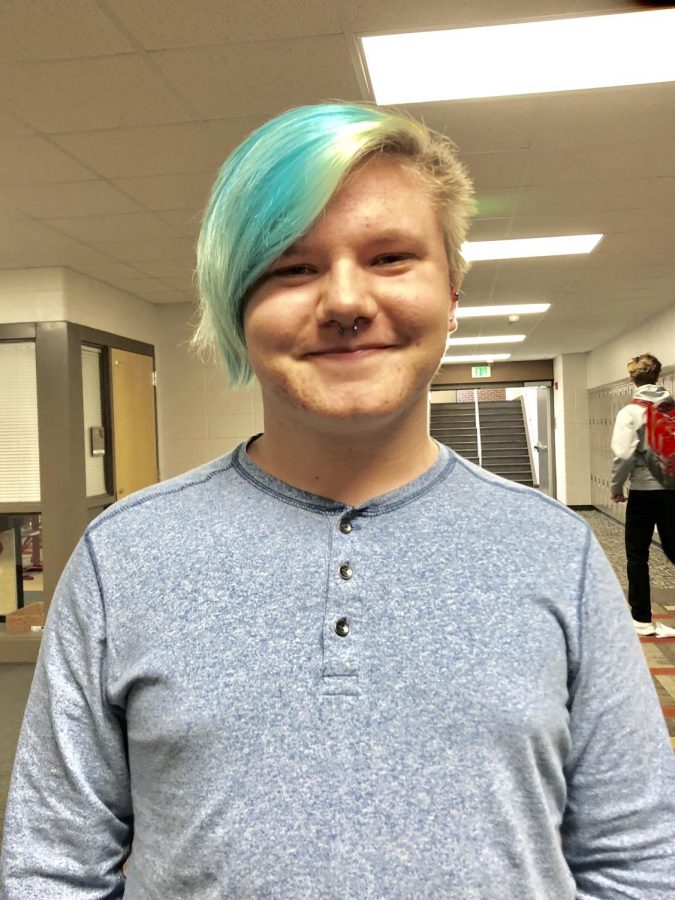SHS student tries to cope with mental illnesses
Sophomore Ian Julian
December 19, 2017
With his electric-blue hair and sweet smile, sophomore Ian Julian is a normal student at SHS. However, Julian deals with very specific problems: Julian lives with anxiety and depressive tendencies.
“It’s hard, because it always feels like your heart is racing, like you don’t know what to do, it kinda confuses you,” Julian said. “It’s hard.”
Julian states that anxiety, for him, can he set off by simply worrying about the many different outcomes any one action can have. He is often plagued by anxiety attacks and can become very paranoid of new situations and new people. Julian also suspects that his sexuality may play a role in his anxiety. Julian identifies as asexual, which means he isn’t interested or inclined to engage in any sexual acts. He believes that having to explain this to people who may be less than welcoming could increase his anxiety.
“It causes anxiety, because I don’t talk about myself and how I feel very much,” Julian said. “Sometimes when I’m around newer people, it makes me anxious, just because I don’t know them that much, so i don’t know how they feel about the LGBT+ community, and stuff, so that kind of makes me anxious to talk about it.“
Along with prolonged anxious feelings, Julian experiences anxiety attacks, which are intense bouts of anxiety characterized by fear, trembling, sweating and an increased heart rate. He estimates that he has an anxiety attack about once a day, and can become very isolated because of them, sometimes even exhibiting symptoms of depression. Julian says that he becomes more shy and sometimes resists interaction with others when he is in the midst of a state of depression.
“I can get very sad, and sometimes it makes me angry,” Julian said. “It just depends.”
Other symptoms for Julian include losing his desire to talk to others and becoming distant. His experiences with anxiety and depression can affect his motivation to engage in activities at school or with his friends.
“Sometimes, when I’m having a panic attack or something, I’ll just not want to do anything except sit and breathe.” Julian said.
There are a variety of strategies people use to help cope with living with depression and anxiety. Some methods include healthy habits such as exercise and diets. Others are meditation, or finding time for more rest. Julian opts for something a little simpler- some quality time with friends.
“I ask if I can go hang out with them and I’ll tell them everything,” Julian said. “My friends have (depression and anxiety) too, so usually they can talk me out of it and calm me down.”
One of Julian’s friends, freshman Elizabeth Valadez, is a friend that Julian goes to often. Valadez has known Julian for years, since his mother babysat the both of them as children. Valadez says they’re best friends, practically brother and sister, and that whenever he feels depressed, he’ll often go to her with his problems. She reports that oftentimes, they’ll talk for hours, so he can get everything off of his chest. Valadez expresses that she often is at a loss of what to do for him during these times.
“It’s sad, ‘cus I’ll be sitting there while we talk in his room and he’s bawling his eyes out to me and I don’t know, I feel like I’m so bad at helping,” Valadez said. “I feel helpless a lot of the time because I don’t know what he’s going through.”
However, Valadez expresses her belief that talking about it is good for Julian, and that it helps to be there for him.
“Afterwards, I can just sense that a weight has been lifted off of his shoulders,” Valadez said. “And if anything, it doesn’t bring us apart, it makes us closer.”
Julian, through his talks with Valadez and others, has often gotten through many hard times. He stresses the importance of talking to others about what you’re going through. He strongly opposes the idea that teenagers cannot have mental illnesses, or that they fake them to seek attention.
“A lot of people don’t think that teens, like we’re over dramatic and don’t have it, but it affects everyone, and it’s actually a real problem with kids these days,” Julian said. “I think it definitely needs to be talked about.”
He suspects that teens now have it worse than teens from before. He attributes much of his added stress to homework, and his worries about if he’ll be able to finish the assignment, and if it will be good enough. He believes that, due to the added pressures put upon teenagers in recent years, they have a higher chance of developing problems.
He believes that maybe the issue of mental illness in teens can be helped by alleviating the pressure put on children these days, and by believing them when they say they have a problem.



